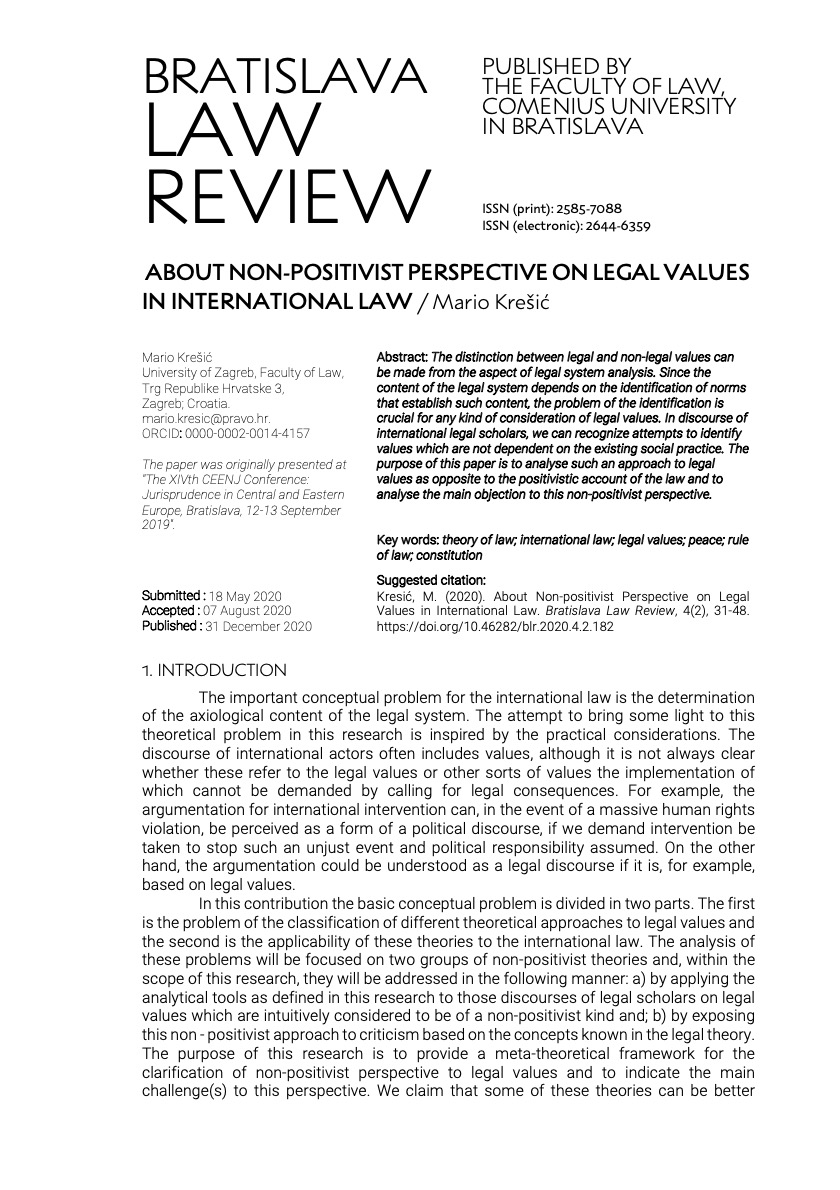About Non-Positivist Perspective on Legal Values in International Law
DOI:
https://doi.org/10.46282/blr.2020.4.2.182Keywords:
theory of law, international law, legal values, peace, rule of law, constitutionAbstract
The distinction between legal and non-legal values can be made from the aspect of legal system analysis. Since the content of the legal system depends on the identification of norms that establish such content, the problem of the identification is crucial for any kind of consideration of legal values. In discourse of international legal scholars, we can recognize attempts to identify values which are not dependent on the existing social practice. The purpose of this paper is to analyse such an approach to legal values as opposite to the positivistic account of the law and to analyse the main objection to this non-positivist perspective.
References
Consolidated versions of the Treaty on European Union and the Treaty on the Functioning of the European Union 2012/C 326/01.
Court of First Instance of the European Communities, Kadi v. Council and Commission, Case T-315/01, Judgement (21 September 2005).
Court of Justice of the European Communities (Grand Chamber), Kadi and Al Barakaat International Foundation v. Council and Commission, Joined Cases C-402/05 P and C-415/05 P, Judgment (3 September 2008).
Brunée, J., & Toope, S. J. (2010). Legitimacy and Legality in International Law: An Interactional Account. New York: Cambridge University Press.
Degan, V. Đ. (1997). Sources of International Law. Hague: Martinus Nijhoff Publishers.
Dickson, J. (2012). Towards a Theory of European Union Legal Systems. In J. Dickson & P. Eleftheriadis (Eds.), Philosophical Foundations of European Union Law. (p. 490). Oxford: Oxford University Press.
Dworkin, R. (1986). Law’s Empire. Massachusetts: Harvard University Press.
Dworkin, R. (2011). Justice for Hedgehogs. Cambridge: Harvard University Press.
Fassbender, B. (2009). The United Nations Charter as the Constitution of the International Community. Leiden: Koninklijke Brill NV.
Franck, T. M. (1988). Legitimacy in International System. The American Journal of International Law., 82(4), 705–759.
Guastini, R. (2011). La sintassi del diritto, seconda edizione. Torino: Giappichelli.
Harašić, Ž. (2015). More about teleological argumentation in law. Pravni Vjesnik, 31(3–4), 23–50.
Kelsen, H. (1952). Principles of International Law. New York: Rinehart and Company.
Kelsen, H. (2008). Peace Through Law. New Jersey: The Lawbook Exchange, Ltd.
Kirchner, S. (2004). Relative Normativity and the Constitutional Dimension of International Law: A Place for Values in the International Legal System? German Law Journal., 5(1), 47–64.
Kokott, J., & Sobotta, C. (2012). The Kadi Case – Constitutional Core Values and International Law – Finding the Balance? European Journal of International Law., 23(4), 1015–1024.
Krešić, M. (2019). The role of peace in Kelsen and Lauterpacht’s theories of International Law. Zbornik Radova Pravnog Fakulteta u Splitu., 56(2), 485–501.
Lauterpacht, H. (2000). Functions of Law, The Function of Law in the International Community. New Jersey: The Lawbook Exchange, Ltd.
Lauterpacht, H., & Lauterpacht, E. (1978). International Law: Volume 1, The General Works: Being the Collected Papers of Hersch Lauterpacht (Elihu Lauterpacht). (E. Lauterpacht,Ed.). London: Cambridge University Press.
Loewensten, K. (1957). Political Power and the Governmental Process. Chichago: University of Chicago Press.
MacCormick, N. (2007). Institutions of Law: An Essay in Legal Theory. Oxford: Oxford University Press.
MacCormick, N., & Summers, R. (2016). Interpretation and Justification. In N. MacCormick & R. Summers (Eds.), Interpreting Statutes: a comparative study. (pp. 511–544). London, New York: Routledge.
Orakhelashvili, A. (2008). The Interpretation of Acts and Rules in Public International Law. New York: Oxford University Press.
Orakhelashvili, A. (2011). Collective Security. New York: Oxford University Press.
Padjen, I. (2006). A Policy oriented search for basic European Values. Dignitas, (71–72), 115–137.
Rauber, J. (2009). The United Nations - a Kantian Dream Come True? Philosophical Perspectives on the Constitutional Legitimacy of the World Organization. Hanse Law Review., 5(1), 49–76.
Raz, J. (1972). Legal Principles and the Limits of Law. The Yale Law Journal., 81(5), 823–854.
Raz, J. (1979). The authority of law: Essays on Law and Morality. Oxford: Oxford University Press.
Raz, J. (2019). The Law’s Own Virtue. Oxford Journal of Legal Studies., 39(1), 1–15.
Schauer, F. (2005). The Social Construction of the Concept of Law: A Reply to Julie Dickson. Oxford Journal of Legal Studies., 25(3), 493–501.
Shiner, R. A. (2005). Volume 3: Legal Institutions and the Sources of Law. In E. Pattaro (Ed.), A Treatise of Legal Philosophy and General Jurisprudence. Dordrecht: Springer.
Visković, N. (1973). Legal Value and the Concept of Law: Contribution to the Theory of Legal Value. Zbornik Radova Pravnog Fakulteta Splitu., 10, 195–224.

Downloads
Published
Issue
Section
Categories
License
Copyright (c) 2020 Bratislava Law Review

This work is licensed under a Creative Commons Attribution-NonCommercial-NoDerivatives 4.0 International License.
The Author(s) transfers copyright to the Article to the Publisher of the Journal by the Licence Agreement.
The Author(s) retains rights specified in the Licence Agreement.
The readers may read, download, copy, distribute, print, search, or link to the full texts of all of the Article of the Journal and use them for any other lawful purpose under specified Creative Commons Licence (CC BY-NC-ND 4.0).











